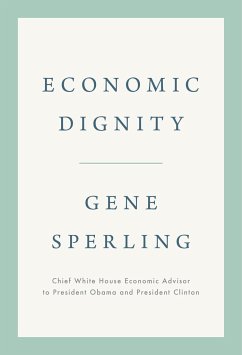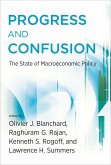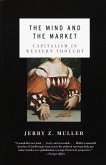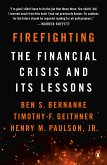"A timely and important new book…It should be our North Star for the recovery and beyond." -Hillary Clinton From one of our wisest and most influential economic thinkers, the only person to serve as Director of the National Economic Council under two Presidents, a profound big-picture vision of why the promotion of dignity should be the singular end goal by which we chart America's economic future When Gene Sperling was in charge of coordinating the shaping and execution of the US government's economic policy in the Obama White House, he found himself surprised and dismayed when serious people in Washington worried out loud to him that the Obama focus on health care was a distraction because it was "not focused on the economy." How, he asked, was millions of Americans' fear that they were a single pink slip or a loved one's serious illness away from financial ruin somehow not considered an economic issue? To him, it was just one more example of a more profound truth he witnessed in his many years in our national economic debate: that when it comes to America's economic policy, there is too little focus on what the end goal should be. Too often, he found that our economic debate confused ends and means; that we measured economic success by metrics like GDP instead of whether the economy was succeeding in lifting up the sense of meaning, purpose, fulfillment, and security of people. Too often, he found debates framed by old divisions or pro-market ideology that increasingly failed to capture whether economic policy was fostering exploitation, economic insecurity, and disillusionment that were too often invisible within our current framework. Now more than ever, at a moment when the very capacity of modern capitalism to avoid accelerating inequality, a hollowed-out middle class, and structural poverty is being questioned, we need to step back and reflect on our ultimate goals. Economic Dignity is Sperling's effort to do just that - to frame our thinking about the way forward in a time of wrenching economic change. His argument combines moral and intellectual seriousness with actual high-level policy experience. Economic dignity, Sperling maintains, can be seen as resting on three pillars. The first: the capacity to care for family without economic deprivation denying people the capacity to experience its greatest joys - the birth of one's children, the companionship of a loving partner, the love of family and friends, the fulfillment that comes from providing. The second: the right to the pursuit of potential and purpose, including the right to first and second chances - the right to a life of active striving. The third: economic participation with respect and without domination and humiliation. All three pillars are rooted in the highest and most noble values of the American project. But getting there is the rub, and in Economic Dignity, Sperling offers paths that policymakers and citizens can follow for years to come. As he puts it, if you live in times when major steps forward are needed, it is important to be clear on your destination - or at least to know the North Star that is guiding you. His answer, in two words, is economic dignity.
One of Amazon's best Business and Leadership books of 2020 so far
Sperling makes a forceful case that only by speaking to matters of the spirit can liberals root their belief in economic justice in people s deepest aspirations in their sense of purpose and self-worth. The New York Times
As the coronavirus pandemic devastates the economy and unemployment claims surge to epic heights, economist Sperling argues that numbers don t tell the whole story . . . prescient. The National Book Review
Gene Sperling draws a compelling case for looking beyond the numbers to the nature and quality of work in the twenty-first century. His clear-eyed, sharp analysis demands a close read by policy makers and the rank and file alike. Economic Dignity shakes up static debates about education, tax policy, labor, and American values, and it should galvanize actors across the political spectrum to reexamine our common purpose. In turn, this thoughtful take reminds us of our capacity for progress when we put people at the center and defend the dignity of all. Stacey Abrams
In a time of ever more powerful technologies and growing economic uncertainty, we need to be clear on our values. Gene Sperling shows why economic dignity should be our end goal and provides a compelling program to bring it within the grasp of all Americans. Economic Dignity is a must-read for every policymaker, economist and citizen. Erik Brynjolfsson, professor at MIT and co-author of The Second Machine Age
Gene Sperling, one of the nation s most distinguished public servants, reminds us that while money matters, life is about much more, and proposes that policymakers focus on dignity, that economic dignity should be the North Star to guide our journey toward greater justice. This book is an exemplary guide toward policies that promote not just employment and good wages, but also the life of purpose and meaning that has been lost to so many Americans in recent decades. Professor Sir Angus Deaton, Nobel Laureate in Economics 2015
Sperling s call to make economic dignity our North Star provides a powerful moral frame for guiding economic policy that can be unifying for all progressives even when we don't agree on every solution. Sperling rightly stresses that we need bold steps to ensure what he calls an economic dignity wage and economy that provides true first and second chances, and that government must play a far bigger and smarter role in ensuring the innovation, worker power, and skills we need to make economic change work for the many and not just the few. Sperling is one of the most important economic thinkers of our time. Ro Khanna, member of Congress
Never have I come across a book that is so intellectually engaging, deeply compassionate, and solutions oriented at the same time. Economic Dignity is all of those things on a topic as encompassing and defining as the economy. Ai-jen Poo, Director, National Domestic Workers Alliance
Economic Dignity points us beyond our fixation on GDP to the ends economic policy should serve promoting the dignity of work and the well-being of families and communities. Gene Sperling reconnects economics to moral and civic purpose and offers a framework for a much-needed debate about how to help those left behind by the winner-take-all economy of recent times. A healthy economy not only delivers the goods, he reminds us; it also provides the basis for mutual respect among citizens. Michael J. Sandel, author of What Money Can t Buy: The Moral Limits of Markets
Gene Sperling gets it. He understands that the Dignity of Work isn't just a political slogan -- it's an ethos; it's who we are as progressives, and it's how we must govern. Defining and fighting for that dignity is at the heart of today's economic debates, and that makes Gene Sperling essential reading. Senator Sherrod Brown
Sperling shows that the question of modern politics is not growth or equity, but growth and equity. Not only that, he shows that with a focus on economic dignity, town can be united with city; rural with urban; young with old; and North with South, as these values transcend both place and identity. It is for that reasonthat this book will end up as required reading this year on both sides of the Atlantic. David Muir, The New Statesman
Sperling makes a forceful case that only by speaking to matters of the spirit can liberals root their belief in economic justice in people s deepest aspirations in their sense of purpose and self-worth. The New York Times
As the coronavirus pandemic devastates the economy and unemployment claims surge to epic heights, economist Sperling argues that numbers don t tell the whole story . . . prescient. The National Book Review
Gene Sperling draws a compelling case for looking beyond the numbers to the nature and quality of work in the twenty-first century. His clear-eyed, sharp analysis demands a close read by policy makers and the rank and file alike. Economic Dignity shakes up static debates about education, tax policy, labor, and American values, and it should galvanize actors across the political spectrum to reexamine our common purpose. In turn, this thoughtful take reminds us of our capacity for progress when we put people at the center and defend the dignity of all. Stacey Abrams
In a time of ever more powerful technologies and growing economic uncertainty, we need to be clear on our values. Gene Sperling shows why economic dignity should be our end goal and provides a compelling program to bring it within the grasp of all Americans. Economic Dignity is a must-read for every policymaker, economist and citizen. Erik Brynjolfsson, professor at MIT and co-author of The Second Machine Age
Gene Sperling, one of the nation s most distinguished public servants, reminds us that while money matters, life is about much more, and proposes that policymakers focus on dignity, that economic dignity should be the North Star to guide our journey toward greater justice. This book is an exemplary guide toward policies that promote not just employment and good wages, but also the life of purpose and meaning that has been lost to so many Americans in recent decades. Professor Sir Angus Deaton, Nobel Laureate in Economics 2015
Sperling s call to make economic dignity our North Star provides a powerful moral frame for guiding economic policy that can be unifying for all progressives even when we don't agree on every solution. Sperling rightly stresses that we need bold steps to ensure what he calls an economic dignity wage and economy that provides true first and second chances, and that government must play a far bigger and smarter role in ensuring the innovation, worker power, and skills we need to make economic change work for the many and not just the few. Sperling is one of the most important economic thinkers of our time. Ro Khanna, member of Congress
Never have I come across a book that is so intellectually engaging, deeply compassionate, and solutions oriented at the same time. Economic Dignity is all of those things on a topic as encompassing and defining as the economy. Ai-jen Poo, Director, National Domestic Workers Alliance
Economic Dignity points us beyond our fixation on GDP to the ends economic policy should serve promoting the dignity of work and the well-being of families and communities. Gene Sperling reconnects economics to moral and civic purpose and offers a framework for a much-needed debate about how to help those left behind by the winner-take-all economy of recent times. A healthy economy not only delivers the goods, he reminds us; it also provides the basis for mutual respect among citizens. Michael J. Sandel, author of What Money Can t Buy: The Moral Limits of Markets
Gene Sperling gets it. He understands that the Dignity of Work isn't just a political slogan -- it's an ethos; it's who we are as progressives, and it's how we must govern. Defining and fighting for that dignity is at the heart of today's economic debates, and that makes Gene Sperling essential reading. Senator Sherrod Brown
Sperling shows that the question of modern politics is not growth or equity, but growth and equity. Not only that, he shows that with a focus on economic dignity, town can be united with city; rural with urban; young with old; and North with South, as these values transcend both place and identity. It is for that reasonthat this book will end up as required reading this year on both sides of the Atlantic. David Muir, The New Statesman








